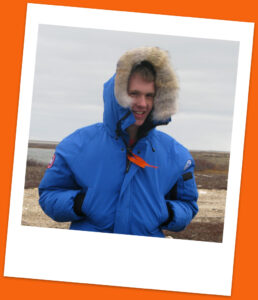Correspondence: I’m ready to fight climate change. Are you?
February 28A recent trip to Canada to observe the real life effects of climate change had a life-changing impact on Grant Duthie, a 17-year-old from the Gold Coast of Australia.
 With nothing but the cold wind running around me, I had plenty of time to reflect on the greatest moral challenge of our time: climate change.
With nothing but the cold wind running around me, I had plenty of time to reflect on the greatest moral challenge of our time: climate change.
Being recently selected to attend the Polar Bears International Teen Leadership Camp in Churchill, Canada, in October with seventeen other ambassadors from around the world, I was given a spectacular platform to launch myself into climate change campaigning.
Since coming back from Canada I have gained a wealth of knowledge and motivation to spread awareness, equipped with my own first-hand experience about the need for action.
This opportunity of a lifetime to see the figurehead of climate change, the polar bear, put things into perspective and gave me a wake up call about climate change and its effects on such a majestic creature.
During the trip I spent four days aboard a mobile tundra buggy, journeying through Wapusk National Park searching for a range of Arctic wildlife including, of course, the polar bear. We saw a total of twenty-two polar bears waiting at the base of Hudson Bay in late October when the sea ice should have already formed –over seven weeks late.
The polar bear is recognised as a signal of biospheric health and their situation is becoming increasingly dire.
Polar Bears rely on the Arctic sea ice freezing over every year as a platform to hunt ringed seals. Yet, due to rising temperatures, the sea ice is freezing over later and melting earlier, leaving less and less time to hunt, ultimately leading to the decline in polar bears across the world.
Globally, scientists predict that all polar bears will be extinct by the year 2050.
Yet we fail to see the cause and effects of their extinction and how connected and interdependent our world is. The loss of polar bears will mean a rise in sea levels; accelerated global warming; the thawing of the permafrost and the opening of methane and carbon hydrates. It will signal economic effects to fisheries and agriculture worldwide, damage to ecosystems, and the extinction of plant and animal species, not to mention the cultural effects on indigenous people and environmental refugees worldwide.
Already some of the effects of climate change are being felt with recent disasters such as the Australian floods, Russian heatwaves, mudslides in China and flooding in Pakistan, which the UN declared the greatest humanitarian crisis in recent history.
It is widely acknowledged that these facts will only intensify as we postpone climate change policy.
The United Nation’s tireless efforts for international mitigation agreements saw more than 190 representatives from all over the world meet up in Cancun in December. After the bickering of Copenhagen in 2009, countries around the world established the first set of targets to peak emissions at 2 degrees Celsius.
While this shows little urgency for the reality of climate change and is still a fairly short-sighted goal, it must be recognised as a step in the right direction and hopefully a turning point.
Two degrees Celsius sounds negligible in the context of our day-to-day weather reports. However on a global scale it could lead to the decimation of glacial ice, global wetlands, vegetation shifts, increasing extreme weather events, marine species extinction and effects on the food chain, forest destruction, loss of snow and ice cover, and major effects on marine and land ecosystems.
My opportunity to participate in the Polar Bear Leadership Camp resonated. I saw the beauty of the world that we are day-by-day privileged to be living in. We cannot forget that we must respect and look after it by living more sustainably and making the right choices with the future in mind.
At the local level, we can help spread the message, start a community garden, support local businesses, buy less packaging, catch public transport, recycle, avoid using air conditioners and heaters, get solar panels, insulate our home, buy recycled goods, turn all our appliances off and put a ‘No Junk Mail’ sign on our letter box.
It is astonishing the impact we can have by implementing these initiatives and helping to save our pristine world.
As Mahatma Ghandi famously once said: “You must be the change you wish to see in the world”.



